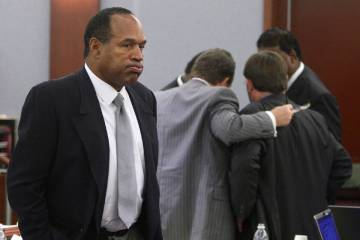47 Democrats in House side with GOP on tax cuts
WASHINGTON -- Forty-seven House Democrats -- enough to give Republicans a victory on taxes if the issue came to a vote -- are breaking ranks with President Barack Obama by calling on party leaders to continue Bush-era tax cuts on investment income.
The lawmakers, led by Rep. John Adler, D-N.J., have sent a letter to House Speaker Nancy Pelosi saying they strongly support extending the current tax rates on capital gains and dividends.
"Raising taxes on capital gains and dividends could discourage individuals and businesses from saving and investing," read the letter, dated Friday and released Tuesday. "We urge you to maintain the current tax rate for both dividend and long-term capital gains taxes."
Reps. Dina Titus and Shelley Berkley of Nevada were among the Democrats who signed the letter. Both were flying to Washington on Tuesday evening and unavailable for comment, aides said.
In a statement provided by her office, Titus said she supported permanently extending Bush-era income tax cuts for individuals who earn no more than $200,000 and families with incomes of $250,000 or less.
"During this difficult economic time, I also believe that we need to temporarily extend the rest of the 2001 and 2003 tax cuts for a year or two while the economy turns around," she said. "At that point we must re-evaluate the impact of the tax cuts on the economy and the deficit."
"Right now, raising taxes in this economic climate could slow down a recovery, but at the same time adding an additional $700 billion to our deficit through a permanent extension of tax cuts for the wealthiest 2 percent is unsustainable," Titus said.
Titus spokesman Andrew Stoddard acknowledged that her view "is different than what the president is calling for."
"She thinks a good route to go is extending them all for a year or two, and then checking out the economy," he said. "There is a difference there on this issue."
Berkley's office referred a query to the letter she signed. It said that by keeping dividends and capital gains taxes low, "we can help the private sector create jobs and allow seniors and middle class households to save and invest more."
Meanwhile, the Senate on Tuesday blocked tax legislation that would have punished U.S. companies that export jobs. The political symbolism of trying to save American jobs, not passing a bill, was the Democrats' closing argument on the economy in the waning weeks of the congressional elections.
Republicans complained that the vote used a serious subject -- economic recovery -- to score points with voters five weeks before the balloting in which all 435 House seats, 37 Senate seats and the Democratic majority are on the line. The bill in question, Republicans said, would make U.S. companies less competitive.
"The liberal Senate leadership has brought forward a politically motivated bill that will never become law," said Sen. Orrin Hatch, R-Utah.
But majority Democrats, now without their plan to close the campaign with a middle-class tax cut, sought to convince voters that the bill showed their commitment to supporting the nation's economic recovery.
"This is part of the continuing focus on jobs," Sen. Debbie Stabenow, D-Mich., told reporters.
The bill would exempt companies that import jobs from paying the 6.2 percent Social Security payroll tax for new U.S. employees who replace overseas workers who had been doing similar work.
The two-year exemption would be available for workers hired over the next three years. The tax cut, estimated to cost about $1 billion, would be partially offset by tax increases on companies that move jobs overseas.
The bill would prohibit companies from taking deductions for business expenses associated with expanding operations in other countries. It would increase taxes on U.S. companies that close domestic operations and expand foreign ones to import products to the United States.
The bill failed, 53-45, to attract the 60 votes required to advance. Four Democrats and one independent joined Republicans to block its progress. The Democrats voting to block the bill were Sens. Max Baucus of Montana, Ben Nelson of Nebraska, Jon Tester of Montana and Mark Warner of Virginia. Also voting no was Sen. Joe Lieberman, I-Conn.
Tax cuts enacted in 2003 set the top tax rate on capital gains and dividends at 15 percent. Those tax cuts expire at the end of the year, and Obama wants to let the top tax rate on capital gains and dividends increase to 20 percent for individuals making more than $200,000 and married couples making more than $250,000.
The letter shows that many Democrats, some of them vulnerable in the upcoming elections, are unwilling to follow Obama on taxes.
But if all 47 Democrats who signed the letter side with Republicans, they could prevail in extending the investment tax rates for all taxpayers, including the wealthy. The letter was signed by several vulnerable freshmen and members of the conservative Blue Dog coalition.
The letter sent to Pelosi highlights divisions among Democrats over their party's message on taxes five weeks before elections in which Democrats will be fighting to maintain majorities in both the House and Senate. Some Democrats have decided it is better politically to distance themselves from Obama and Pelosi as they campaign to keep their jobs.
The letter raises fresh doubts about how Congress will address the expiring tax cuts when lawmakers return to Washington for a lame-duck session after the election.
The tax cuts on investments were part of a package enacted under President George W. Bush that lowered income taxes for families at every income level. All of the tax cuts expire at the end of the year.
Obama and Democratic leaders in Congress want to extend the tax cuts for individuals making less $200,000 and married couples making less than $250,000. Republicans and several rank-and-file Democrats want to extend them all -- even those for the wealthy -- at least temporarily.
Democratic leaders in Congress had been pushing for a vote to extend middle-class tax cuts before lawmakers go home to campaign for the Nov. 2 congressional election. But action on the tax cuts was postponed until after the election when Democrats could not agree on how to proceed.
Some Democrats are wary of supporting Obama's plan to let taxes rise for the wealthiest Americans, fearing they would be accused of supporting a tax hike. Other Democrats think they have a winning message of fiscal responsibility while making the rich pay more after years of relative prosperity.
"It is imperative that the House of Representatives be given a chance to vote on the expiration of the 2001 and 2003 tax cuts for the middle class before we adjourn," Reps. Bill Pascrell Jr., D-N.J., and Mike Capuano, D-Mass, wrote in a letter to House leaders.
With no vote on the tax cuts scheduled before the election, Democrats are left writing letters to their leaders to publicize their positions.
"The speaker has stated clearly that Congress will extend middle-class tax cuts this year," Pelosi spokesman Brendan Daly said. "There is no question that Congress will do so."
Republicans, meanwhile, say it is irresponsible for Democratic leaders to send lawmakers home without addressing the Bush tax cuts.
"I think it's a dereliction of duty for Speaker Pelosi to adjourn this Congress without addressing the No. 1 question on the minds of Americans and small businesses, and that is, what's my tax rate going to be?" said House Republican Whip Eric Cantor of Virginia.
Stephens Washington Bureau Chief Steve Tetreault contributed to this report.
Letter from U.S. House members on continuing tax cuts


















